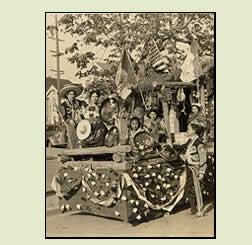



Community and Social Life: Ritmo del Barrio
"My mother and I, we came from El Paso, Texas. That first year it was a bit difficult
to get used to the difference of living here [in the United States, in Oakland].
El Paso, Texas was like it was in Mexico. It is another Mexico, stores and everything
in Spanish. And we got here and there was nothing like that. Not even corn tortillas—just
those [made] of wheat flour and bread."
Dominguita Velasco (born in Mexico in 1901; arrived in Oakland in 1922)
The social and cultural life of the Latino community of Oakland in the last
century is a story of resilient cultural traditions. However, change and accommodation
to American styles of cultural expression, from music and dance to food and
ceremonial
holidays, also play a part in the tale. At first, adapting to American life
was not easy. As Dominguita Velasco put it so evocatively: "My mother suffered because
she was accustomed to corn tortillas, not those made of flour. There were none
here, not even [in] Mexican restaurants, nor [in] stores, nothing like that." The
lack of corn tortillas symbolized the neglected presence of Mexicans in Oakland
at the time. But Dominguita Velasco persevered, as she and other Mexicans began
to build upon their knowledge of their cultural past to forge a sense of identity
in the midst of living in this country. For Velasco, a school pageant on American
ethnic groups provided an opportunity to assert her cultural heritage:
"At that time, each ethnic group at the end of the year made a presentation [about
their culture]. There were few Mexicans, but then we started thinking that
we Mexicans could not be left behind. So that was when I started to promote
the idea that we should present something, a traditional Mexican dance, and
we started asking around, who played the guitar? Who could sing? And so we presented
a number and we were not left out [of the pageant]."
Excerpt from Life Stories: Voices from the East Bay Latino Community
Download .pdf

